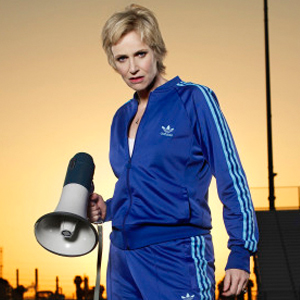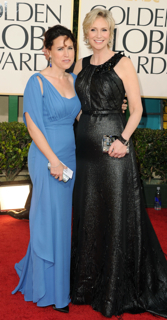
Jane’s remarkable brand of humor is both larger than life and incredibly nuanced at the same time. She’s been typecast as the aggressive, hard-nosed bitch for a long time. But somehow, you end up loving her crazy, rule mongering, cutting jibe-throwing characters as much as, if not more than, the nicer human being she’s set out to torment. And it’s not because her characters have a secret heart of gold. Sue Sylvester is still a conniving, self-centered weasel 99 percent of the time. But we can still love her because she’s a conniving self-centered weasel with a soul.
Sue Sylvester may be almost cartoonishly broad at times, but Jane always finds the slivers of humanity underneath her bravado, and lets us know they’re there. In Jane’s hands, Sue isn’t just sweet Mr. Shue’s archnemesis, she’s a woman who’s taken to using her talents for evil after a life full of the same frustrations that the “gleeks” put up with every day. We don’t so much love to hate her as we hate to love her.

Sue is a classic scenery chewer of a role, but because Jane allows us to understand her at a fundamental level that most comic villains never even consider approaching, we get to enjoy her antics all the more, because we feel her pain. She’s not just creatively dastardly, she’s providing us with a dose of wish fulfillment. Like Will Shuester often does, we can’t help but wish that we could be as evil as Sue is, every once in a while.
Maybe Jane can provide her often villainous characters with such sympathy and grace because she seems to be one of the more gracious human beings in tinsel town at the moment. Happily married to a pretty (lady) psychiatrist and a loving step-mom to her wife’s young daughter, she’s at peace in her own skin after a long and, as she calls it in her autobiographical Happy Accidents, “anxious” youth. Jane, a former alcoholic, understands that grace is earned, and doesn’t only come to happy, shiny people who always do the right thing … and it shows.
So, what are we learning this week? If only we could learn to be as effortlessly hilarious and insultingly endearing as Jane Lynch — but I think we can settle for a reminder that the heart, even of a harsh, gleefully evil character, is the most important muscle to exercise when tickling funny bones. Comedy comes not just from sharp edges, but also from soft centers. It never hurts to understand your villain, whether you’re writing her or facing her down every day at work, somewhere in there is a human being just like you.
